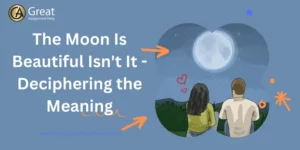If you are an anime fan, then you would have probably heard the Japanese saying “tsuki ga kirei desu ne,” which translates to “The moon is beautiful, isn’t it?” But do you know what this lovely phrase means? If you have no idea, then read this blog.
Here, we have explained everything about the popular Japanese phrase “The moon is beautiful, isn’t it?” including its origin, meaning, and how to respond when someone says it to you.
“The Moon Is Beautiful, Isn’t It?”- Revealing the Mystery
“The moon is beautiful isn’t it?” – Meaning of the Phrase
In Japanese literature and pop culture, the phrase “The Moon Is Beautiful Isn’t It” is more commonly used. This saying is more than just a comment about the visual charm of a moon. Typically, it is a poetic expression of the moon’s emotional impact on humanity.
The phrase particularly hints at the deep relationship an individual has with the moon. That relationship portrays the feelings of romance, awe, and wonder.
However, this expression need not be used only for referring to the moon. It can be used to connect with other people who also admire the moon in the same way you do. It is simply like a polite acknowledgment of the sky’s beauty that you enjoy.
When you are about to go for a short break from your hectic schedules to appreciate nature’s masterpiece, you may say, “Hey, let’s all admire the moon together!” Hereafter, when you see the moon, remember to say, “The moon is beautiful, isn’t it?” It is the best way of appreciating the evening beauty that every one of us shares.
In Japanese, the phrase “The moon is beautiful, isn’t it?” also indicates “I love you.”It is intended to communicate affection indirectly because it is sometimes considered impolite in Japanese society to express one’s sentiments or desires explicitly. Instead of stating, “Sorry, I can’t make it to your party,” a better response would be, “That would be a little inconvenient for me.” Similarly, expressing “I love you” may be too blatant, so they prefer saying “tsuki ga kirei desu ne” (Isn’t the moon beautiful?) instead.
The phrase is a type of “code” or secret way to express affection. Although not everyone in Japan is aware of it, those who know will understand what you’re attempting to express.
Also Read: Amazing Geology Research Topics
“The moon is beautiful isn’t it?” – Origin of the Phrase
Every one of us would have gazed at the night sky and exclaimed “Wow, the moon is really beautiful,” But the Japanese admire the moon by quoting a specific phrase. They say Utsukushii desu ne tsuki, which means “The Moon Is Beautiful Isn’t It”. From where does this phrase originate?
The saying “The moon is beautiful, isn’t it?” originated from the rich tapestry of Japanese culture. The phrase “Utsukushii desu ne tsuki” (Utsukushii desu ne tsuki) simply expresses admiration for the moon’s radiance.
Natsume Sōseki (1867-1916), a well-known Japanese writer is claimed to have told a touching story during his teaching years. One lovely day, when a student translated the English Phrase “I love you” into Japanese, he responded, “Japanese folks do not say things like that blatantly. So, instead of that, he asked to interpret it in Japanese as “tsuki ga kirei desu ne” (“The moon is beautiful, isn’t it?”)
This statement captures the profound admiration for nature’s beauty that exists within Japanese society. It is frequently employed in poetry, literature, and casual discussions to express the feeling of admiration for the moon’s beauty that is shared by all.
Japan has honored the moon in several festivals and traditions throughout history. In specific, during the Mid-Autumn Festival, families will gather together to observe the moon and tell tales. This expression may have originated from such cultural events. Especially, at such events, attendees would share their admiration for the moon’s magnificence, fostering a feeling of harmony.
This phrase has evolved into more than simply words; it reflects the Japanese people’s deep connection with nature. Today, it still evokes a sense of wonder and community, reminding us of the moon’s beauty in Japanese culture.
Also Read: Excellent Solar System Project Ideas for Students
How to respond – “The moon is beautiful, isn’t it?”
When someone says “The moon is beautiful, isn’t it?” to you, take your time to enjoy that moment.
Let your eyes portray the sparkling stars in your heart and let your smile express how much you are appreciated. Your spirits become one through this lovely exchange of glances, much like when you dance beneath the moon’s ethereal glow.
You may add softly, “Yes, it truly is captivating,” allowing your voice to express your adoration. Alternatively, you may playfully say, “The moon can’t compare to your radiance.”
Moreover, as the night embraces you both, allow your heart to speak the language of passion. Share your admiration for the moon, as well as any memories associated with its silvery brightness. Let your words be like stars illuminating the night sky.
Moreover, depending on your thoughts and feelings you can also respond in a variety of ways as suggested below.
- Agree Enthusiastically
- “Absolutely!” “It’s so magical.”
- “I could not agree more. It’s beautiful tonight.”
- Add a Poetical Touch
- “Indeed, the moon’s beauty is a timeless delight.”
- “Oh, the moon’s radiance always leaves me in awe.”
- Express Emotions
- “It’s breathtaking.” “Makes you appreciate the world.”
- “It truly is beautiful. It calms the soul, doesn’t it?
- Share Your Viewpoints
- “Definitely. “I love how it illuminates the sky.”
- “Yes, and it’s even more special with the stars around it.”
- Create Conversation
- “You’re correct. “Do you know any moon legends from various cultures?”
- “Absolutely. “Have you ever tried moon gazing on a quiet night?”
- Express Humorously
- “There’s no doubt about it.” “Someone should give the moon an award!”
- “Definitely. “I believe the moon has been practicing its ‘glow-up’!”
Japanese Responses to “The moon is beautiful, isn’t it?”
In Japan, the phrase “The moon is beautiful, isn’t it?” is used instead of “I love you”. So, when someone approaches you in that aspect, then you may reply with the following answers.
- “Shin demo ii wa” (I can die happy). This is used to convey mutual love and could mean “I love you too”.
- “Sou desu ne” (It’s true, isn’t it?). This is a subtle signal that you share the same sentiment and could signify “You’re right” or “I agree”.
- “Anata mo utsukushii” (So are you). This is a kind of direct answer.
- “Hai, demo sore ni fureru koto wa dekimasen” (Yes, but you can’t touch it). It is an indirect yet evident way of saying no to someone. This implies that they may want you, but they can’t have you.
Why is the phrase “The moon is beautiful, isn’t it?” used?
Here, let us look at some major reasons behind using the phrase “The moon is beautiful, isn’t it?”
- The term expresses a general sense of awe and adoration for the moon’s splendor. People may instantly connect with others by repeating these phrases, which express a common respect for nature.
- The phrase exemplifies poetic sentiment that allows people to express themselves creatively throughout regular interactions.
- Mentioning the moon’s beauty can generate discussions on nature, the universe, and personal experiences. It’s a soft method to begin a conversation and tell stories.
- The term is profoundly embedded in Japanese culture and it frequently occurs in literature, poetry, and conversation. It stands as a tribute to tradition and also acknowledges the moon’s cultural significance.
- This word emphasizes humans’ yearning to connect with nature’s beauty. It is a simple approach to remind ourselves and others about the incredible beauty that surrounds us.
- The moon has long been associated with emotions, love, and desire in literature and art. This sentence may elicit sentiments of nostalgia or romance.
- Sharing the idea that the moon is beautiful promotes a sense of community among people. It is a shared experience that crosses linguistic and cultural boundaries.
- By saying it out, you can encourage people to take a moment to be conscious and notice the beauty of the current moment.
- Because of its simplicity, individuals from all walks of life can relate to and understand the term. It serves as a reminder that even in everyday facets of life, there may be beauty.
- This expression fosters cross-cultural understanding and communication by teaching people about various viewpoints on nature and beauty. It is especially useful when used in conversations between people of diverse cultural backgrounds.
Wrapping Up
Hopefully, by now, you will have gained a better understanding of the meaning and origin of the famous Japanese saying “The moon is beautiful, isn’t it?” However, in case, you would like to know the real meaning of several other sayings in a foreign language, contact us immediately.
On our platform, we have numerous experts in different languages such as English, Japanese, French, and more. According to your needs, they will offer you high-quality language assignment help online. In specific, our professionals will assist you in accurately finishing your assignments on time and getting a better understanding of any language.
Simply book your order and enjoy all the benefits of our language assignment help services at an affordable price.



